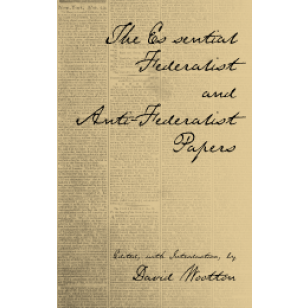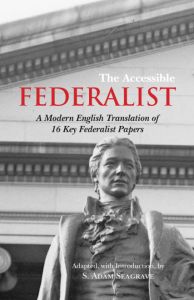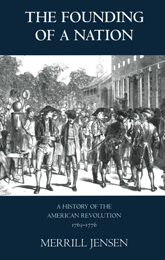The Essential Federalist and Anti-Federalist Papers
“An excellent edition of the key writings surrounding the adoption of the American Constitution. The learned Introduction brings to life the key intellectual debates at the heart of modern constitutionalism as well as those concerning the American Constitution. A fine critical edition.”
—Frederick Rosen, University College London
“This is an excellent collection that fills a need—of all the document collections on the founding era, there is no one-volume collection with both Federalist and Anti-Federalist opinions—and none so affordably priced! I look forward to adopting this book in my general U.S. history and advanced U.S. legal history courses.” —Christopher Capozzola, History Department, MIT
eBook available for $7.95. Click HERE for more information.
Here, in a single volume, is a selection of the classic critiques of the new Constitution penned by such ardent defenders of states’ rights and personal liberty as George Mason, Patrick Henry, and Melancton Smith; pro-Constitution writings by James Wilson and Noah Webster; and thirty-three of the best-known and most crucial Federalist Papers by Alexander Hamilton, James Madison, and John Jay. The texts of the chief constitutional documents of the early Republic are included as well.
David Wootton’s illuminating Introduction examines the history of such “American” principles of government as checks and balances, the separation of powers, representation by election, and judicial independence—including their roots in the largely Scottish, English, and French “new science of politics.” It also offers suggestions for reading The Federalist, the classic elaboration of these principles written in defense of a new Constitution that sought to apply them to the young Republic.
Reviews:
“An excellent edition of the key writings surrounding the adoption of the American Constitution. The learned Introduction brings to life the key intellectual debates at the heart of modern constitutionalism as well as those concerning the American Constitution. A fine critical edition.”
—Frederick Rosen, University College London
“This is an excellent collection that fills a need—of all the document collections on the founding era, there is no one-volume collection with both Federalist and Anti-Federalist opinions—and none so affordably priced! I look forward to adopting this book in my general U.S. history and advanced U.S. legal history courses.”
—Christopher Capozzola, History Department, MIT
“A very useful, affordable edition of Federalist and Anti-Federalist writings. . . . The introductory essay is beautifully written and offers useful insights.”
—Margaret Groarke, Manhattan College
Contents:
INTRODUCTION:
- Understanding the Constitution.
- Suggestions for Further Reading.
- A Note on the Texts.
THE ANTI-FEDERALISTS:
- George Mason, Objections to the Constitution of Government Formed by the Convention (November 1787).
- Address of the Minority of the Pennsylvania Convention (December 18, 1787).
- Speech of Patrick Henry before the Virginia Ratifying Convention (June 5, 1788).
- Speeches of Melancton Smith before the New York Ratifying Convention (June 20, 21, 23, 1788).
- Letters of Cato (4 and 5) (November 8 and 22, 1787).
- Letters of Centinel (1) (October 5, 1787).
- Essays of Brutus (6, 11, 12, 15) (December 27, 1787 – March 20, 1788).
THE CONSTITUTION DEFENDED:
- Speech of James Wilson before the Pennsylvania Ratifying Convention (November 24,1787).
- A Citizen of America [Noah Webster], An Examination into the Leading Principles of the American Constitution (October 17, 1787).
THE FEDERALIST:
- No. 1: Introduction (October 27, 1787) [Hamilton].
- No. 2: Concerning Dangers from Foreign Force and Influence (October 31, 1787) [Jay].
- No. 6: Concerning Dangers from War between the States (November 14, 1787) [Hamilton].
- No. 7: The Subject Continued and Particular Causes Enumerated (November 17, 1787) [Hamilton].
- No. 8: The Effects of Internal War in Producing Standing Armies and Other Institutions Unfriendly to Liberty (November 20, 1787) [Hamilton].
- No. 9: The Utility of the Union as a Safeguard against Domestic Faction and Insurrection (November 21, 1787) [Hamilton].
- No. 10: The Same Subject Continued (November 22, 1787) [Madison].
- No. 12: The Utility of the Union in Respect to Revenue (November 27, 1787) [Hamilton].
- No. 14: An Objection Drawn from the Extent of Country Answered (November 30, 1787) [Madison].
- No. 15: Concerning the Defects of the Present Confederation in Relation to the Principle of Legislation for the States in Their Collective Capacities (December 1, 1787) [Hamilton].
- No. 16: The Same Subject Continued in Relation to the Same Principle (December 4, 1787) [Hamilton].
- No. 23: The Necessity of a Government at Least Equally Energetic with the One Proposed (December 18, 1787) [Hamilton].
- No. 24: The Subject Continued with an Answer to an Objection Concerning Standing Armies (December 19, 1787) [Hamilton].
- No. 28: The Same Subject Concluded (December 26, 1787) [Hamilton].
- No. 31: [Concerning Taxation]: The Same Subject Continued (January 1, 1788) [Hamilton].
- No. 33: The Same Subject Continued (January 2, 1788) [Hamilton].
- No. 35: The Same Subject Continued (January 5, 1788) [Hamilton].
- No. 37: Concerning the Difficulties Which the Convention Must Have Experienced in the Formation of a Proper Plan (January 11, 1788) [Madison].
- No. 39: The Conformity of the Plan to Republican Principles: An Objection in Respect to the Powers of the Convention Examined (January 16, 1788) [Madison].
- No. 47: The Meaning of the Maxim, Which Requires a Separation of the Departments of Power, Examined and Ascertained (January 30, 1788) [Madison].
- No. 48: The Same Subject Continued with a View to the Means of Giving Efficacy in Practice to That Maxim (February 1, 1788) [Madison].
- No. 49: The Same Subject Continued with the Same View (February 2, 1788) [Madison].
- No. 51: The Same Subject Continued with the Same View and Concluded (February 6, 1788) [Madison].
- No. 52: Concerning the House of Representatives, with a View to the Qualifications of the Electors and Elected, and the Time of Service of the Members (February 8, 1788) [Madison].
- No. 55: The Same Subject Continued in Relation to the Total Number of the Body (February 13, 1788) [Madison].
- No. 57: The Same Subject Continued in Relation to the Supposed Tendency of the Plan of the Convention to Elevate the Few above the Many (February 19, 1788) [Madison].
- No. 62: Concerning the Constitution of the Senate with Regard to the Qualifications of the Members, the Manner of Appointing Them, the Equality of Representation, the
- Number of the Senators, and the Duration of their Appointments (February 27, 1788) [Madison].
- No. 63: A Further View of the Constitution of the Senate in Regard to the Duration of Appointment of Its Members (March 1, 1788) [Madison].
- No. 70: [Concerning the Constitution of the President]: The Same Subject Continued in Relation to the Unity of the Executive, with an Examination of the Project of an
- Executive Council (March 15, 1788) [Hamilton].
- No. 78: A View of the Constitution of the Judicial Department in Relation to the Tenure of Good Behavior (May 28, 1788) [Hamilton].
- No. 83: A Further View of the Judicial Department in Relation to the Trial by Jury (May 28, 1788) [Hamilton].
- No. 84: Concerning Several Miscellaneous Objections (May 28, 1788) [Hamilton].
- No. 85: Conclusion (May 28, 1788) [Hamilton].
THE CONSTITUTIONAL DOCUMENTS:
- Articles of Confederation (July 9, 1778).
- The Virginia Plan (May 29, 1787).
- The Constitution of the United States of America (September 17, 1787).
- The Bill of Rights (December 15, 1791).
INDEX
About the Author:
David Wootton is Anniversary Professor of History, University of York.






